#statement of purpose format
Explore tagged Tumblr posts
Text
that reminds me, have you ever seen how weird they got about stimboards on tiktok? fucking wild
#luka 🦐#bf who cares (more than me) aboutt this topic take it away:#first of all stimboards don't make sense in a video format#which is why many people started complaining that stimboards don't even follow their theme#tumblr stimboards are really just gifsets of whatever visual stims a person want to see often linked to a specific aesthetic character etc#this works on tumblr bc you can put it in a 3x3 grid the very middle being a picture of your theme to tie it all together#or just another gif if you didn't have a theme#ofc it doesn't 'fit the theme' you're consuming it in an inferior way#second - people started making ''unsafe'' stimboards (with jumpscares and possibly paranoia-inducing statements)#(or something I've never seen any)#this was only really a problem because people were being disingenuous about it and labeling them as 'safe /srs'#side note: do not fucking misuse tone tags on purpose that defeats the entire point you asshole#which actually did spawn a debate about whether it was okay to misuse tone tags as part of the joke/whatever#it's not. ty for coming to my ted talk#so then for a bit we had people posting 'unsafe' stimboards and labeling them safe and deleting any comments correcting that#it got to the point where people came up with heart colour emoji codes to sneakily say whether it was actually safe or not#even now there's a lot of stimboards on tiktok with a 'not babying' disclaimer#bc I guess someone decided stimboards are babying autistic people (and decided that for every autistic person ever ofc [sarcastic])#anyway the whole thing is bonkers#moral or the story stay away from tiktok#: thank you for that#any typos are *not* being fixed because we are *not* typing all that again
3 notes
·
View notes
Text
How to Write an SOP for Australia: Tips for a Successful Application
Writing an effective Statement of Purpose (SOP) for Australia is crucial to your study visa application. The SOP helps universities assess your background, motivations, and academic qualifications. It should clearly explain why you are interested in a specific program and how it aligns with your career goals.
Key tips include:
Research the university and tailor your SOP accordingly.
Structure your SOP with clear sections, such as an introduction, academic background, work experience, and career goals.
Use concise and formal language, avoiding complex sentence structures.
Proofread multiple times to ensure clarity and professionalism.
For a detailed guide on writing a standout SOP, visit How to Write an SOP for Australia.
#SOP for Australia#how to write an SOP for Australia#Australia study visa SOP#Australian university SOP#statement of purpose Australia#SOP format for Australia#tips for SOP writing#study in Australia#Australia SOP guidelines#SOP for international students.
0 notes
Text
actual writing advice
1. Use the passive voice.
What? What are you talking about, “don’t use the passive voice”? Are you feeling okay? Who told you that? Come on, let’s you and me go to their house and beat them with golf clubs. It’s just grammar. English is full of grammar: you should go ahead and use all of it whenever you want, on account of English is the language you’re writing in.
2. Use adverbs.
Now hang on. What are you even saying to me? Don’t use adverbs? My guy, that is an entire part of speech. That’s, like—that’s gotta be at least 20% of the dictionary. I don’t know who told you not to use adverbs, but you should definitely throw them into the Columbia river.
3. There’s no such thing as “filler”.
Buddy, “filler” is what we called the episodes of Dragon Ball Z where Goku wasn’t blasting Frieza because the anime was in production before Akira Toriyama had written the part where Goku blasts Frieza. Outside of this extremely specific context, “filler” does not exist. Just because a scene wouldn’t make it into the Wikipedia synopsis of your story’s plot doesn’t mean it isn’t important to your story. This is why “plot” and “story” are different words!
4. okay, now that I’ve snared you in my trap—and I know you don’t want to hear this—but orthography actually does kind of matter
First of all, a lot of what you think of as “grammar” is actually orthography. Should I put a comma here? How do I spell this word in this context? These are questions of orthography (which is a fancy Greek word meaning “correct-writing”). In fact, most of the “grammar questions” you’ll see posted online pertain to orthography; this number probably doubles in spaces for writers specifically.
If you’re a native speaker of English, your grammar is probably flawless and unremarkable for the purposes of writing prose. Instead, orthography refers to the set rules governing spelling, punctuation, and whitespace. There are a few things you should know about orthography:
English has no single orthography. You already know spelling and punctuation differ from country to country, but did you know it can even differ from publisher to publisher? Some newspapers will set parenthetical statements apart with em dashes—like this, with no spaces—while others will use slightly shorter dashes – like this, with spaces – to name just one example.
Orthography is boring, and nobody cares about it or knows what it is. For most readers, orthography is “invisible”. Readers pay attention to the words on a page, not the paper itself; in much the same way, readers pay attention to the meaning of a text and not the orthography, which exists only to convey that meaning.
That doesn’t mean it’s not important. Actually, that means it’s of the utmost importance. Because orthography can only be invisible if it meets the reader’s expectations.
You need to learn how to format dialogue into paragraphs. You need to learn when to end a quote with a comma versus a period. You need to learn how to use apostrophes, colons and semicolons. You need to learn these things not so you can win meaningless brownie points from your English teacher for having “Good Grammar”, but so that your prose looks like other prose the reader has consumed.
If you printed a novel on purple paper, you’d have the reader wondering: why purple? Then they’d be focusing on the paper and not the words on it. And you probably don’t want that! So it goes with orthography: whenever you deviate from standard practices, you force the reader to work out in their head whether that deviation was intentional or a mistake. Too much of that can destroy the flow of reading and prevent the reader from getting immersed.
You may chafe at this idea. You may think these “rules” are confusing and arbitrary. You’re correct to think that. They’re made the fuck up! What matters is that they were made the fuck up collaboratively, by thousands of writers over hundreds of years. Whether you like it or not, you are part of that collaboration: you’re not the first person to write prose, and you can’t expect yours to be the first prose your readers have ever read.
That doesn’t mean “never break the rules”, mind you. Once you’ve gotten comfortable with English orthography, then you are free to break it as you please. Knowing what’s expected gives you the power to do unexpected things on purpose. And that’s the really cool shit.
5. You’re allowed to say the boobs were big if the story is about how big the boobs were
Nobody is saying this. Only I am brave enough to say it.
Well, bye!
4K notes
·
View notes
Text
How to Write a Great SOP for Australian Universities?

The Statement of Purpose (SOP) is an important aspect when it comes to studying abroad. This document is presented to the admissions authority along with the application form while applying to any university in Australia. A well-thought SOP for Australia can make your application stand out amongst the pool of applicants. Therefore, it is the prime responsibility of the applicant to showcase their ambitions, skills, and experiences considerately to the university in the form of an SOP. To get a better insight into the SOP for Australia, get a sample from the study abroad consultants at Shuraa Education.
#sop format for australia#statement of purpose for australia#sop for australia student visa#sop for australia
0 notes
Text

The Importance of Strong PHD SOP and How to Get Started
Understanding the pivotal role of a compelling phd SOP Sample is crucial for prospective doctoral candidates. This article delves into the significance of a strong SOP in the application process and provides actionable insights on initiating the writing journey. Learn about key components, effective storytelling, and aligning your aspirations with program offerings. With this guide, discover how to craft a standout SOP that not only captivates admissions committees but also sets you on the path to academic success.
0 notes
Text
A Comprehensive Guide to Writing Gina Dialogue!!!

Do YOU like writing tgaa fics, but find yourself struggling to understand the speech habits of Gina Lestrade? Well, fortunately for you, I love linguistics and accents almost as much as I love Gina - so I've compiled a breakdown of every quirk in her speech!
(Full analysis under the break!)
Most of Gina's speech patterns can be broken down by three fundamental facts:
She speaks with a thick Cockney accent
She's uneducated, which leads to various grammar troubles
She uses a lot of informal cockney terms/slang
Let's get into it section-by-section!
(Note: Formatting looks a lot better on mobile!)
Section 1: Cockney Accent
So I’m an theater kid, and I've done dialect training for Cockney accents before - it's one of my best ones imo - so that certainly helped me write this section! Even without that, though, it's pretty easy to identify how her accent appears in her speech. Let's break it down!
Drop h's
Example: Here becomes 'ere
Drop g’s at the end of words
Example: Going becomes goin'
A few other word ends that get dropped:
Of becomes o'
And becomes an'
Th changes depending on the word - Thank you to annoyingloudmicrowavecultist for properly explaining how this works in the tags!
Voiced th becomes v
Example: With becomes wiv
Unvoiced th becomes f
Example: Nothing becomes nuffin'
For writing purposes, if a word would become unrecognizable with this change, it's left the same (but in actual speech, it would be pronounced differently)
Example: Father remains as father (but would be pronounced like fovva)
Th always remains intact at the start of words
Example: Thing remains as thing (but would be pronounced like fing)
Miscellaneous word changes
Something becomes summat (but other times is just somefin' - she's not consistent with either)
What becomes wot, whatever becomes wotever
Tomorrow becomes tomorra
Because is often shortened to 'cause, which becomes cos
Isn't almost always becomes ain't
Thank you / no thank you becomes ta / no ta
Some words spill together or are slurred
With that becomes wivvat, with it becomes wivvit (This one isn't actually used in-game, so you don't have to use it either, but it reflects how she'd actually be pronouncing it)
Isn't it becomes innit
Doesn't it becomes dunnit
Suppose becomes s'pose
Don't know becomes dunno
Probably becomes prob'ly
You might change - Another loose/inconsistent rule. Can depend on how the sentence would be pronounced out loud, but mostly is just a vibe
You becomes ya
Your/you're becomes yer
Yourself becomes yerself
Section 2: Grammatical Errors
Gina is an uneducated East End orphan, so it should come as no surprise that she makes mistakes here and there. Here are her consistent ones! Some of these are confusing/hard to explain, so I included specific examples.
Will say me instead of my, and meself instead of myself
Example: "I dunno much about guns meself."
Incorrect tense usage of was/were in negatives - Instead of I/it wasn’t, she’ll say I/it weren’t
Example: "I was up in a balloon, weren't I?"
Incorrect tense usage of does/do in negatives - Instead of he doesn’t, she’ll say he don’t
Example: "Somefin' wot 'e don't want people readin'."
Double negatives
Ever becomes never in negative statements
Example: "I swear on my life, I ain't never laid eyes on that dandy before."
Never + anything becomes never + nothing
Example: "I never done nuffin' o' the sort!"
Never + anyone becomes never + no one
Example: "All me life, growin' up in the slums, I've never trusted no one."
Haven't you ever becomes ain't you never
Example: "Ain't you lot never gone over an 'ouse lookin' for dough when the owners are out o' town?"
The word that or who in the context of ascribing a feature to a subject is replaced by the word what
Example: "She's always goin' on about all them cases wot Sholmes is lookin' into."
Other example: "I think I wouldn't fancy me chances wiv a lawyer wot lives in a place like this."
Will say them instead of those
"All them skylights open, dead easy."
Will say no more instead of anymore
"Ya dropped it, so it ain't yours no more."
She’ll sometimes mess up bigger, unfamiliar words. This one's entirely in your discretion what words she might mess up. Some canon examples:
“Supperment” instead of supplement
“Mantlescript” instead of manuscript
On a similar note, she'll sometimes confidently get sayings wrong and think she sounds smart
“Toby's...'ow did they put it...? ...Oh, yeah! A 'bone-fide' detective!”
Section 3: Cockney Terms/Slang
In addition to her thick dialect, growing up in the East End means Gina has also adopted a plethora of unique words and phrases. This'll be more like a vocab section!
Cockney rhyming slang - Some words are replaced with phrases that rhyme with them. She uses a few in canon:
Instead of believe, she’ll say Adam an’ Eve
“Would you Adam an' Eve it, eh?! Wot a mug!”
Instead of face, she’ll say chevy chase
“Yeah, I can see it written all over yer chevy chase!”
Interjections/Exclamations
Blimey - Express surprise or shock
"Blimey, yer right! That streak o' light in the photo looks just like an arrow, dunnit?"
Cor - A general interjection, kind of a euphemism for god
"Cor, listen to you! Ya stumble across a bit o' balloon an' suddenly yer the best investigator in the world!"
Oi - I doubt I need to define this one, but it's basically the equivalent of "hey"
"Oi! That's off limits up there!"
Words for people
Cove, bloke - A boy or man. Gina tends to use cove more often than bloke.
"That's where the cove ended up after 'is 'instant kinesis' or wotever they call it."
"When I lifted the last bloke's purse, 'e got wise to me."
Dandy - A conceited, fashionable upperclass man. Can be used as a noun or adjective.
In reference to Ashley Graydon: "I swear on my life, I ain't never laid eyes on that dandy before."
Dee - Thank you to uzukirie for figuring this out in the replies of this post - dee is short for detective!
To Sholmes: "I don't need no 'elp from some stuck-up dee!"
About Gregson: "Yeah, the dee let me keep it. After I looked daggers at 'im for long enough."
Swell - A wealthy or elegant person. In canon, Gina uses this exclusively in reference to McGilded.
"It's because o' that, this swell found me. …'E did 'elp me get away, mind."
Miscellaneous vocab
Dodgy - Suspicious
"It was amazin' when you showed that dodgy professor's dodgy experiment was a total fix!"
Rum - Odd or strange
"I mean, wot's the point of spendin' a joey to make a few bob, eh? That's a rum idea, innit?"
Coppers - Cops
"If you do wot the grown-ups tell ya, it'll get yer mates dragged off by the coppers. Or worse."
Scarper - Flee/run away/leave in a hurry. Also comes from rhyming slang - Scarper = Scapa Flow = Go
"If I did that, 'e said 'e'd let me scarper before the coppers showed up."
Have a butcher's - Take a look. Also comes from rhyming slang - "butcher's hook" = look
"Most days I push the cushion up wiv me 'ead an' look out the crack. Then I can 'ave a butcher's at who I'm gonna fiddle."
Rude words/phrases :)
Gordon Bennett - Expresses surprise or contempt - kind of a euphemism for goddammit.
"Gordon Bennett! You lot!"
Flamin', bleedin', - General emphasis. Pretty much just gentler ways of saying fucking.
Note!! You might be tempted to make Gina say "bloody", since that's well-known British slang, but she never says that. She says bleedin' in its place.
"Don't be so flamin' rude, 'Oddo!"
"It's lies every bleedin' place ya look in this world, innit?"
Bleedin’ Nora - A variation of "Bloody Norah", a surprised/irritated interjection.
"Wot the bleedin' Nora, 'Oddo?! Wot 'ave you gone an' done?!"
Bogtrotter - A derogatory term for an Irish person. She uses this to refer to McGilded.
"Look at the mess it's got you into, believin' in that bogtrotter!"
Mug - An idiot.
"You can't do it from inside, you mug."
Blue blazes - An alliterative exaggeration of "blazes". A euphemism for hell.
"Where the blue blazes 'ave you been, eh?"
Cobblers - Rubbish/nonsense. Literally, it means testicles - derived from Cockney rhyming slang, where "cobbler's awls" = balls.
"All this nonsense about the boss plannin' to kill people… It's cobblers!"
And 1.2k words later, that's pretty much it! Now you can write Gina dialogue spot on <3
Feel free to suggest anything I'm missing/got wrong - I come back and edit this for accuracy's sake every time I notice something I left out, or when people in the replies/tags point things out!
#tgaa#dgs#ace attorney#the great ace attorney#gina lestrade#dai gyakuten saiban#gaac#tgaac#the great ace attorney chronicles
722 notes
·
View notes
Text
Renna's identity and more Caria stuff
I think we have finally come to a satisfying conclusion on the identity of the Snowy Crone, aka Renna.
This came from a conversation with Qamarmoon (not on Tumblr, but check out the Blusky account [x]), who pointed out an interesting bit about her and the two sisters Rennala and Rellana. Together they appear to follow the triple deity format: Renna being the Crone, Renalla being the Mother, and Rellana being the Maiden. It's also worth pointing out that each facet of this Triple Goddess is also connected to moon phases.
It was also correctly pointed out that Snowy Crone must have known the Dark Moon if she was capable of teaching Ranni about it.

But the only ones we have seen capable of such contact with the moons appear to be part of Carian royalty.
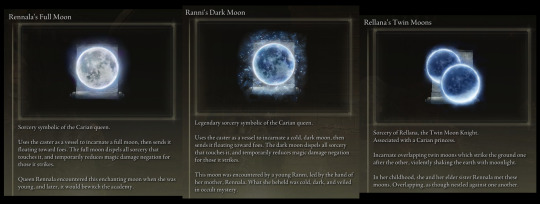
The one exception may be the Nox... however, they seemed to have owned the Moonlight Altar in the past, as the Cathedral of Manus Celes shares architecture with the Church of Vows, an old Liurnian ruin intimately connected to the Nox and their rituals.


(My friend @katyspersonal also believes the Nox's Black Moon might have simply been an imitation they created, as it seems to have worked differently than the other moons we know of. For example, it wasn't just one person envisioning it, but multiple. It was also physically present underground and was even broken apart by Astel, while these other moons seem much more distant. It's not necessary to believe this in order for the whole theory I'm proposing to work, but if it's true it would certainly strengthen it lol)
In any case, Qamarmoon also posited that the three sisters might have indeed referred to Renna, Rennala and Rellana, and that Seluvis' Rise wasn't the only one that got its name changed, but Ranni's too, leaving Renna's as the only untouched one. Interestingly enough, it's also where you find the Snow Witch set.
The whole convo made me suddenly remember something I had always taken for granted... the Ice Crest Shield.
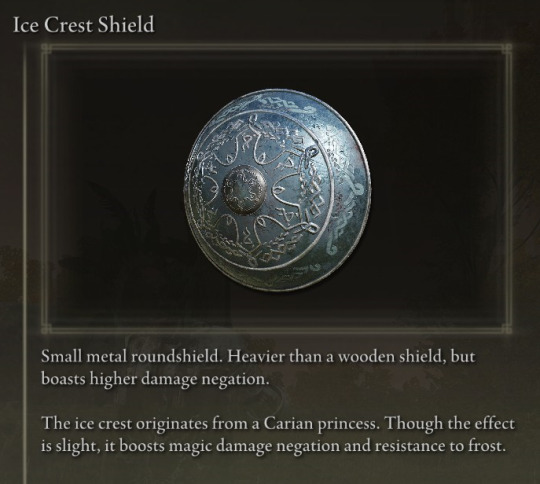
This small shield, found in Caria Manor, has a snowflake design that was said to be the crest of a Carian princess. Now, I had always assumed this was referring to Ranni, but I realized something. If it were, it wouldn't have been vague about it. When symbols and insignias are relevant to a specific Demigod or important person they are never spoken about like that... and besides, the crest should be found somewhere else related to Ranni herself if it was hers.
But it's not, and what really seals the deal for me is that Ranni's connection to the cold wasn't something well-known, as it came from her secret mentor, the Snowy Crone.

Ranni, for all intents and purposes, was a moon witch like her mother, earning the title of Lunar Princess.
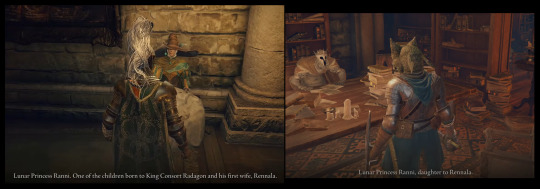

Even Blaidd's blade was imbued with frost only when he vowed to never leave Ranni's side no matter what, walking that dark path with her. The cold seems intimately tied to her secret grim fate.

Even more damning, is that the Glintstone Sorcerers of the Lazuli Conspectus, a Carian-affiliated branch of the Academy of Raya Lucaria, wield the Ice Crest Shield.
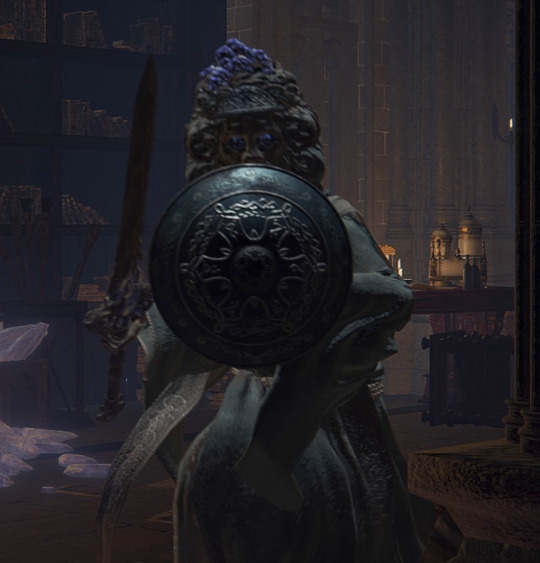
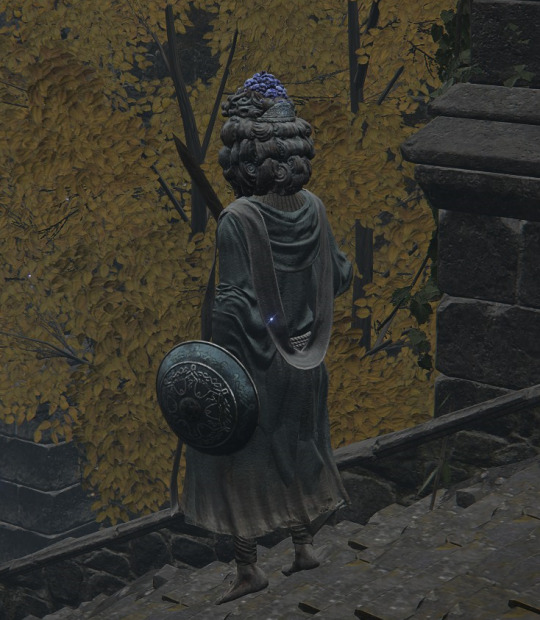
However, the Conspectus more than likely predates Ranni by a long margin and seems to have no connection to her overall. Furthermore, the colors of their robes, while likened to the hues of a Full Moon, do contain white accents reminiscent of the Snow Witch set, which was Renna's before it was Ranni's.
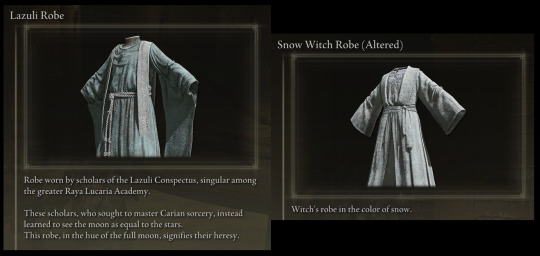
So then, could it be that Renna is the Carian princess mentioned on that very shield? Maybe even Rennala and Rellana'a older sister! There seems to be quite a bit of evidence for it!
But, I understand if you are skeptical. After all, why wouldn't she be the Queen of Caria if she was the eldest daughter, or even mentioned at all? Better yet, how would it work if Caria as royalty was established by Rennala herself as stated by her Remembrance?
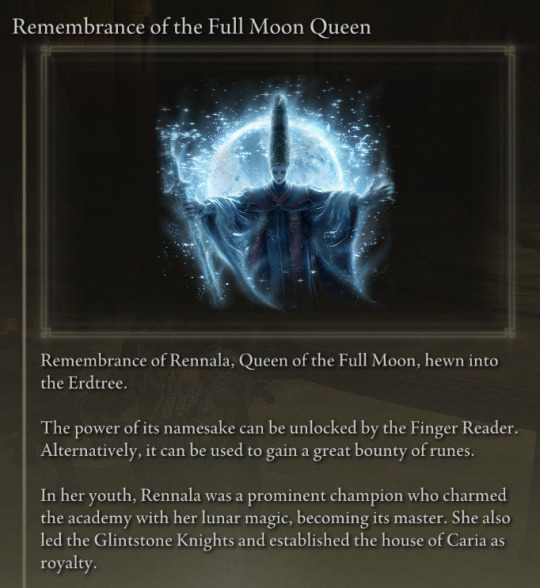
Let's start with the latter. I do not believe that statement is proof enough to come to such a conclusion. Don't get me wrong, it would be, if it weren't for the fact it's the only instance of this, and it's contradicted by so many other descriptions.
And you may say it's not true. The Stargazer Heirloom also implies the same. After all, it speaks of a young astrologer finding the Full Moon and becoming queen.
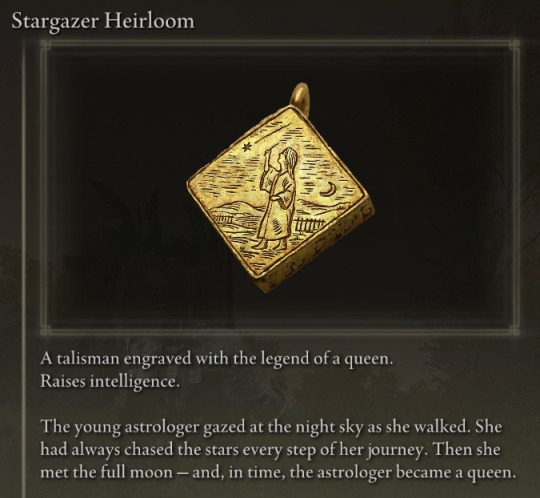
It does sound a lot like Rennala, right? But two small bits prevent it from being the case. The first one is the fact that it's engraved with a "legend". The only other heirloom with this description is that of the Two Fingers. Meanwhile, the two heirlooms depicting Radahn and Malenia, prominent figures of the current Lands Between, are said to be depicting "a scene from a heroic tale". Legend implies a certain degree of antiquity, which Rennala does not seem to possess.
The other detail, which is even more weighty, is that she is referred to as an astrologer. Astrologers were ancient people situated on the Mountaintops of the Giants and were once their neighbors. So close was their bond that they created a sword to honor it.

Some of the Carians, like Rellana, even believed that Fire and Moon should always be together, which is part of the reason she followed Messmer during his Crusade.
So the astrologers are the ancestors of the Carians... but they are not the only ones who descend from them. All Glintstone Sorcerers are descendants, in fact!

After all, it was an ancient astrologer who once envisioned the Founding Rain of Stars, basis of all Glintstone Sorceries and the foundation of the Academy of Raya Lucaria.
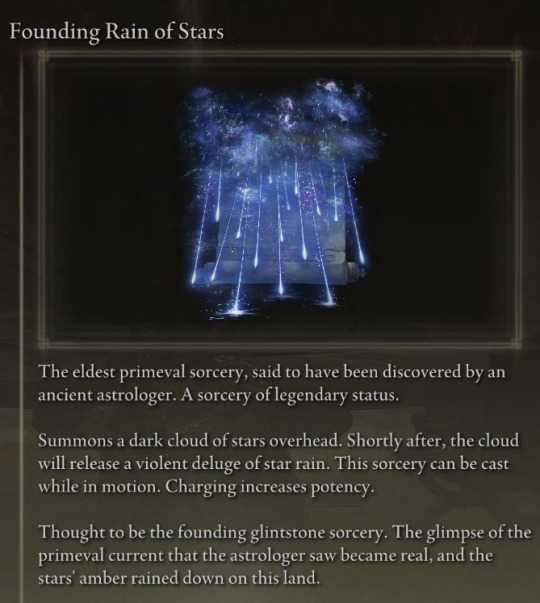
If Rennala had been that very astrologer girl in the legend, then she not only would have been incredibly ancient by now, but it would also mean she enchanted the academy immediately after its founding, since they'd be part of the same time period. This would leave them no room to develop the opposing beliefs that created the current friction between the two factions, which doesn't seem to be the implication.
The woman in the heirloom is most likely just Rennala's ancestor, who envisioned the Full Moon and changed the trajectory of her branch of astrologers forever.
This isn't the only thing against the idea Rennala is the sole founder of the house of Caria as well as its one queen! Counter-evidence comes in the form of several descriptions mentioning long-standing traditions involving princesses and matrimony... which wouldn't make sense if Rennala had been on the throne child-free with only her little sister for god knows how long...

In fact, another point towards the idea that Rennala was a princess herself once is her use of a particular ability, said to be employed by Carian princesses specifically. And she's the only Carian character to ever use this technique...
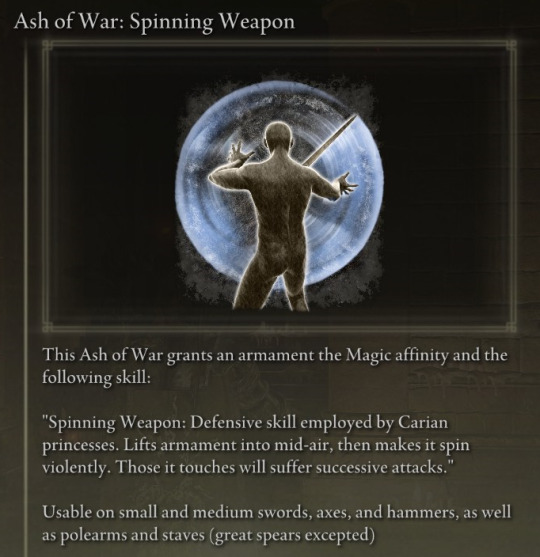

My very last bit of evidence is the fact she is also known as the "last Queen of Caria". A title given to her by her own daughter Ranni.

Now, there would be no point in making such a specification if she had been the ONLY queen of Caria up to that point. What makes more sense, coupled with everything else we have already talked about, is that she is the last queen in a long line of queens...
Simply put, I don't believe the Remembrance implies that she is the sole founder of the House of Caria. It is already considered a "house" after all, so it had the status of nobility at least, and noble houses, as you may know, aren't always in charge as rulers. Several houses contend for sovereignty, and it's often a cyclical thing.
Perhaps Rennala was simply the one to bring Caria back to its former heights by discovering the very same Full Moon that once uplifted her people long ago... this also means that multiple people can witness the same moon, which fits nicely with both Renna and Ranni envisioning the same celestial object.
This leads us back to the question of "what happened to Renna then, and how can she be the older sister if she didn't inherit the throne and Rennala did?".
I think the answer lies in the moon she had discovered. @katyspersonal proposed an idea some time ago, that the moons discovered by the Carian royals sort of foreshadow their eventual fate (It's mentioned in this post here [x] though it's mostly about a hypothetical Moon Goddess as a counterpart to the Fell God). It's something Qamarmoon also concluded independently, so I wouldn't say it's a nonsensical conclusion to draw.
The gist of it is that Rennala's Full Moon foreshadowed her union with the Erdtree, as the full moon is the result of its surface being bathed in the light of the sun, Rellana's Twin Moon foreshadowed her fate intertwining with Messmer, their two powers standing together, and Ranni's Dark Moon foreshadowed the lonesome occult path she'd have to walk to "obscure" the light of Grace.
The theme of celestial objects controlling the fate of all individuals is something quite prominent in the setting, so I'm pretty sold on this concept personally!
So yes, I believe Renna simply walked an occult path that led her to obscurity, maybe even of her own volition. To renounce her birthright in pursuit of something different... it's exactly what Rellana had done in an attempt to stand by Messmer's side.

It's also quite common for prominent figures to completely vanish in the Lands Between, as odd as it is to say. For example, we know that all the Demigod children of Marika who did not survive the Night of the Black Knives (minus Godwyn of course) have all but disappeared from history. We only know they existed, not what they did or accomplished. It's bizarre, to say the least...
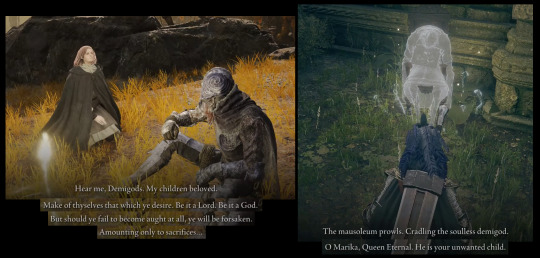
Not to mention the entirety of the Land of Shadow, obscured and forgotten as an endless war is waged. Rellana too has had any mention of her having existed seemingly scrubbed from history, at least in the Lands Between.
Furthermore, it's exactly what Ranni did as well, erasing all of her steps and seemingly vanishing without a trace.
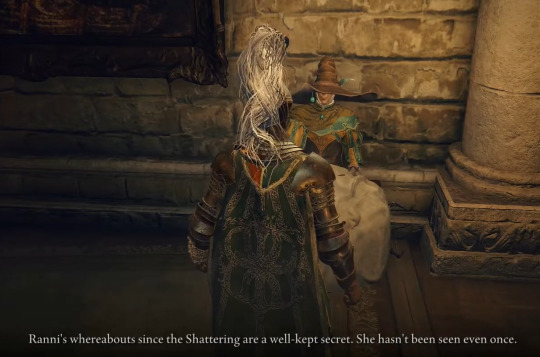
But what became of Renna then? Perhaps her insistence that Ranni fears the Dark Moon is from experience, and she doesn't want her to commit the same mistakes...
The two most prominent traits of the Snowy Crone are the blue skin and the four arms, features that remind me of the accursed followers of the Royal Revenants, often known as Wraith Callers due to the bells they use to attract vengeful spirits.
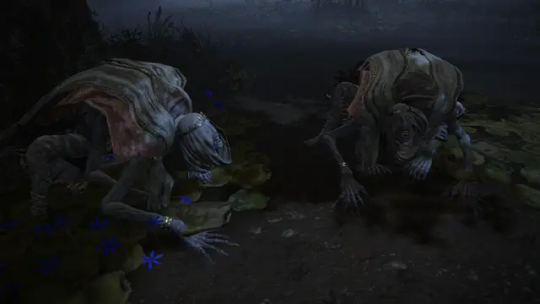

Interestingly enough, Liurnia has the biggest concentration of these guys out of all locations in the game. Most prominent for this theory is their large numbers in the Moonlight Altar, a place that's very relevant to all Carian royalty.
These beings are said to be all cursed, explaining their spectral, twisted forms. Now, I don't think Renna became like the ones we find in-game. They don't seem to hold any connection to the moon and ice, but rather to curses and wraiths. However, she might have died and been cursed in a similar manner, twisting her into a form closer to that Ranni's body is based on.
It's also worth pointing out that Ranni is the one who hands the Spirit Calling Bell to us, which is basically the good version of the Wraith Calling Bell that the Revenant Followers use. However, it's unclear why she wants to give it to Torrent's new master, so it might have not belonged to the Snowy Crone originally.
-
So in conclusion... the idea that the Snowy Crone was actually a princess of Caria named Renna, sister of Rennala and Rellana makes a surprising amount of sense! It neatly explains the crone's knowledge of the Dark Moon, the existence of the Three Sisters in general, the identity of the princess the ice crest was a symbol of, the suspiciously familiar name of Renna feeling just like she is part of the Carian family... it just works so well I think!
Finally. It's a conclusion I am satisfied with... Elden Ring feels very complex regarding most of the unseen people in the cast. Gently waiting for the day we can finally understand the Gloam-Eyed Queen too in such a satisfying manner. Then I will know peace lmao.
---UPDATE---
Ok, so this line from Iji was brought to my attention in the comments, mentioning Ranni as the "first heir in the Carian royal line".
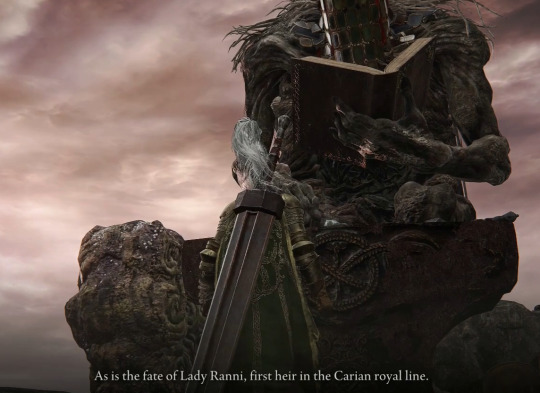
This almost makes it sound like there weren't any heirs before her, which would invalidate literally everything I've said so far about Rennala not being the first Carian queen.
So I decided to check the Japanese script [x], and this line is as follows there: "カーリア王家正統の王女たるラニ様の、運命もまた同じはずです". The part we are gonna focus on is the one I've highlighted.
That doesn't translate to "the first heir in the Carian royal line" but rather "the legitimate princess (正統の王女) of the royal house of Caria (カーリア王家)".
This means that my argument is still safe and sound. Ranni is simply a legitimate heir to the throne, not the first one to be heir. There's also a possibility they didn't mean it to be taken literally, but you are never too sure with these decisions... so yeah, just thought I'd make an addendum so it's addressed in the post itself. I mean, not everyone reads the comments after all!
Okie, addendum over.
#elden ring#snowy crone#witch renna#rennala queen of the full moon#ranni the witch#lunar princess ranni#rellana twin moon knight#man I had to look through so many things lmao#honestly it never made sense rennala was the first queen#too many historical things about princesses lol#but finallyyyyy#I wasn't even a big believer of renna being the name of the snowy crone but this convinced me wholeheartedly#so I guess ranni trained with her disgraced aunt without even knowing#that's sick lol#val-post
81 notes
·
View notes
Text
I think pretty regularly about the claim against the queerness of BL that BL was originally constructed for and by women, especially straight cis women. To begin, the last clause of that statement frankly has no possibility for legitimate measurement. Even without the problems of queer identity formation and identification that might prevent people from identifying themselves as such, publishers and marketing analysts haven't actually been going out surveying sexualities. My bigger issue with the claim, however, lies in the implication that women ought to have no voice in the creation and depiction of queer male characters, when the relationship between women and queer men has been foundational for both at a broad level (and for many queer men like me, personally).
On my bookshelf, I have a collection of personal essays titled "Girls Who Like Boys Who Like Girls: true tales of love, lust, and friendship between straight women and gay men." I've had a preoccupation long preceding my engagement with BL with those types of relationships. I looked for it in media to feel represented. The ending of My Best Friend's Wedding where Julia Roberts character ends the movie dancing with her gay best friend was an even happier ending in my mind than romance. Then, there were the women who had their hearts broken by a gay protagonists coming-out narrative like Abby in Love, Simon only to reassemble it with a deep friendship. I had to adjust my ideas of queerness when viewing stories from cultures with gender segregation in schooling or more broadly. For me, gay male identity had a relationship to women (all shapes, sizes, and sexualities) at its core. We all lay distanced from macho masculinity and its orientations.
Queer men had a role in constructing many revolutionary female personas and characters that influenced women's self-perceptions and societal roles, for better and for worse. Think of the Euro-American fashion designers, the hair and make-up artists, the writers and directors who collaborated and/or shaped the great models, divas, and icons of the twentieth century, and likely prior (although the concept of queerness becomes a very different beast beyond Euro-America in the past 100 years). Behind the Screen: How Gays and Lesbians Shaped Hollywood, 1910-1969 by William J. Mann provides a wonderfully intricate and well-researched history about that work. Both women's rights and women's wrongs: queer men created them and queer men celebrated them, ideologically and in the marketplace, in a partnership that had a purpose for mutual freedom from puritanical laws and social expectations.
Did they always hone in on the realities of women's experience? Certainly not. Realism, as we know it, was neither in-line with the genre expectations at the time nor a fully-realizable possibility for men who only bore passing witness to their female allies. Witness always comes with its limits on perspective, but those limits are the forges of storytelling. Instead, these men, despite the areas of ignorance, designed complex and empathetic portraits of power, faltering, suffering, and striving, across the spectrum of feminine to butch.
I will forever kick myself for forgetting the book or article or post I read where a gay-identified man discusses how women might not have insight into all the aspects of every day gay life, but they see and create a version of gay men that's devoid of the self-pity and self-effacing irony gay men have portrayed themselves with historically, which somehow arrives at an emotional reality that feels more honest to his experience. That's the essence of BL for me. The queerness lies not in the accuracy of anal sex depictions or relationship dynamics--some reflect reality and some don't, so what? The creators of BL as a genre develop queer male characters that are soft, sensitive, and often without the artifices gay men have had to put on to endure. To quote a Carly Rae song, they 'Cut to the Feeling.'
Women's fictional prowess in writing queer men isn't novel to BL. One of the most notable examples is Mary Renault, a prominent queer English author in the mid-twentieth century of especially historical fiction, like The Charioteer, The Last of the Wine, and her Alexander the Great trilogy, among others. Enjoy here a elder gay man's engagement with her fiction for The Guardian. It's not simply that her books struck a chord with some gay men, they influenced their self-perceptions, influenced the genre of gay fiction, and garnered an even broader audience of support for queer characters, holding bestseller status prior to the legalization of homosexuality.
What's so noxious and ignorant about the criticism with which I started, even as some people bring it up with good intent, is the idea that an identity is created in isolation. Our experiences are not ours alone. We impact other people, and other people are watching us with care. Women have long had an outsized role in producing influential fiction and circulating it with joy over its observations about people and their social dynamics. Why set a boundary for them around queer men, when in fact we have a whole history of reasons to understand one another? Not all women will get it because they're not a monolith, and not all queer men will vibe with each or even any of the stories because neither are they. Still, BLs' observations might hold truths about queerness for some that other genres don't offer.
We actually have a few scholars offering evidence of BLs' influence, if so far limited, in queer self-concepts. In "Faen of Gay Faen: Realizing Boys Love in Thailand betwixt Imagination and Existence" by Kang-Nguyen Byung'chu Dredge, the author describes how in Thailand "gay couples recreate Japanese bishonen (beautiful boy) and BL imagery in their own photos." That essay's alongside many others that detail the relationship of BL to fan identities across East and South Asian nations in a collection, Queer Transfigurations: Boys Love Media, edited by James Welker, with the input of many Asian scholars (2022). I'd recommend it to people interested with the caveat that there's been massive political and cultural shifts regarding these topics in those regions since even 2022. Thailand's marriage equality law wasn't initially submitted until 2023! And the BL industry has grown dramatically.
Women and queer men and, in fact, plenty of people with gender identities outside of the western binary have built up these stories and this industry together. Women's contributions or exclusions of certain gay male practices don't necessarily make a work less gay. I probably sound like a broken record at this point trying to widen the breadth of queer inclusion on my blog.
Is there even a possibility for something not to be queer in my book? Well, yes. Boys kissing boys won't fall into that category, though, unless its played to disgust the audience and discourage queer relationships. And there are instances in many queer works, Western and BL alike, including media by queer-identified individuals, that disparage specific queer relational dynamics or behaviors or simply fail to evoke the full-force of queer desire. Of course, we all fail on these fronts sometimes, allies and queers alike.
What I will say is that many women were and continue to be as much as a part of my queer development as queer men, if not more than. I value their insights. I value how they have listened to me. I value their observations about what they see in me. I value their vision for my feelings and future even if it's not always what I have in mind for myself. They have an important place in my life and have every right to have an important place in queerly crafting BL. If we have an issue, let's do our best to name the actual issue rather than revert to over-generalizations about someone's identity.
111 notes
·
View notes
Text
Become Your Best Version Before 2025 - Day 6
Creating Your Personal Mission Statement
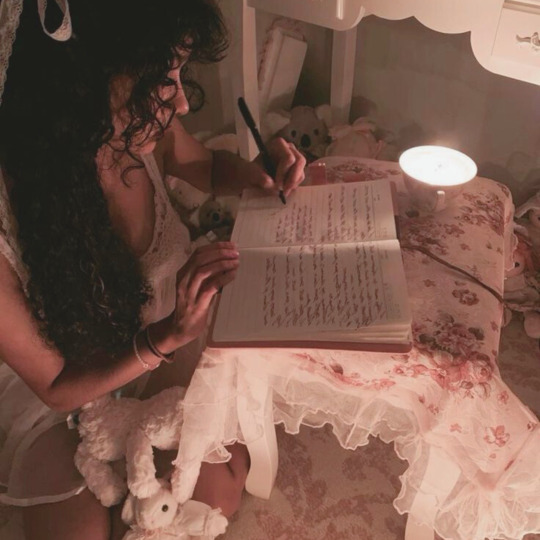
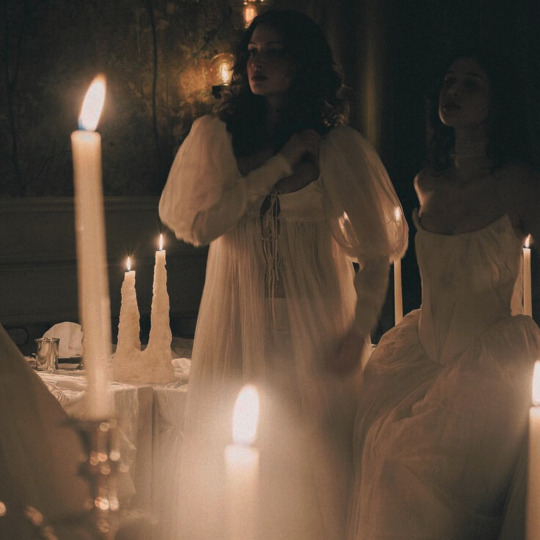
Hey Goddesses! Isn't it amazing how getting clear on our goals yesterday made everything feel more focused? Today, we're taking it one step deeper by creating something really special, your personal mission statement.
You might be thinking, "Isn't that just for businesses?" But think about your favorite Disney princesses, Mulan discovered her true mission wasn't about meeting society's expectations, but protecting those she loved. Tiana's dream of owning her restaurant gave every decision purpose. And Moana? Her mission to save her island helped her overcome every obstacle. Their stories remind us that having a clear purpose changes everything.
Let's make this super practical. Grab your journal (yes, again, we're becoming best friends with it by now!). Instead of trying to write some grand, fancy statement right away, let's start with three simple questions:
"What lights you up inside?" Think about those moments when you're so engaged that you forget to check your phone. Maybe it's helping others learn, creating art, solving problems, or making people laugh.
"Who do you want to be for others?" Not what you want to do, who you want to be. A source of strength? An inspiration? A helper? A creator? The person who always knows how to make others feel seen?
"When your story is being told, what do you want people to say?" Not about what you achieved, but about the impact you had on others and the world around you.
Look at your answers. See any patterns? Circle words or phrases that make your heart beat a little faster. These aren't just words, they're clues to your mission.
Want to see how this works? Take someone like a teacher who wrote: "To spark curiosity and confidence in young minds by creating a safe space for questions and mistakes." Simple, right? But it guides every lesson they plan and every interaction with their students.
Or, to continue with the Disney Princess metaphors: think about how Aurora had to find her own path between two worlds, your mission statement helps you navigate your choices. And like Jasmine, who knew she wanted more than what palace walls could offer, your mission statement helps you dream bigger.
Now it's your turn. Look at those words you circled. Start playing with them. Try these formats:
"To bring more _________ into the world by ____________" "To help others ___________ through_________ " "To create __________ by _____________"
Write down a few versions. Say them out loud. Which one feels like it could be your "Part of Your World" moment? Which one makes you feel like you're ready for your own adventure?
Here's the beautiful thing, your mission statement isn't a cage, it's a compass. It doesn't limit your path; it helps you choose which paths are worth taking.
Put your statement somewhere visible. Let it challenge you when Netflix asks if you're still watching. Let it guide you when opportunities come knocking. Let it remind you of who you're becoming.
What's your personal mission statement? If you feel comfortable sharing it in the comments, your words might be exactly what someone else needs to read today!
See you tomorrow for Day 7 of our journey to become our best selves before 2025!
♡ ☆:.。 Keep glowing, babes! ♡ ☆:.。 With love, Goddess Inner Glow.
#self love#personal development#be confident#be your best self#be your true self#become that girl#becoming that girl#becoming the best version of yourself#better version#confidence#girlblogging#growth mindset#it girl#it girl energy#self improvement#self acceptance#self appreciation#self confidence#girlblogger#girl blogger#girl blog aesthetic#that girl#self help#self care#self development#lifestyle#dream life#self concept#glow up tips#goddessinnerglowblog
86 notes
·
View notes
Text
grah Thinking About my tma x mechs au again,,, Lyf is there bc im obsessed with the aus where they reunite with the mechs,, this wasnt meant to be the purpose of the post but heres a lyf doodle im still trying to figure out their design:
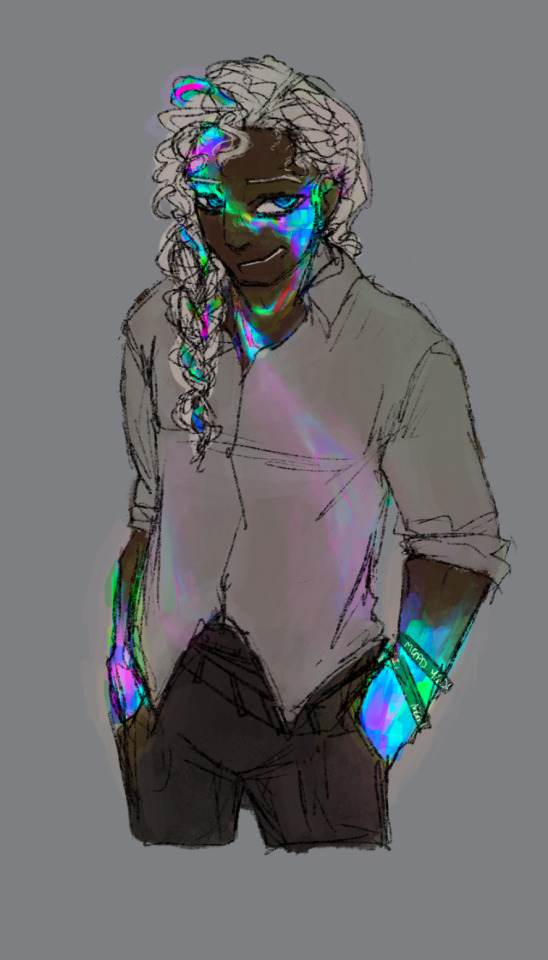
i dont like much of it but the bifrosty bits are awesome,,, ANYWAYS where was i,,
rest is under the cut bc my ramblings got long
ashes toy soldier and jonny were blasted down to earth for some reason against their will by the other mechs (probably just for fun) and toy soldier immediately wandered off and found (was found by?) the stranger; ashes and jonny are having a competition to see how many fucked up things they can do without anybody catching on and discovering who they are. they did not anticipate the sheer amount of supernatural stuff on this planet that Nobody Talks About
jonny refers to the way he dresses as the archivist as his lyf cosplay
also in this au jonny uses he/him but as jon uses they/them,, i said this in a previous post but in case anyone's confused about how i refer to him in this post
back to toy soldier with the stranger, nikola finds them and is like 🫵 ur just like me fr and like. idk if she yoinks its voicebox (third hand smh) or if she just has a different one but its uh,, i lost my train of thought hang on
actually i think it would be funnier if it somehow took nikola's place on accident. maybe it yoinks her mannequin head and cool outfit (it likes fun uniforms!) and everyone just believes it.
idk man i thought it would be funny if the two animate models played by jessica law were somehow stuck in the same body, but reading up on toy soldiers backstory my idea wouldnt work,,
maybe toy soldier comes to earth way earlier, back when nikola is made and whatshisname mr orsinov models nikola after them and they're kinda just there from the beginning,,, i need to relisten to nikola's statement
sorry this has devolved into me thinking out loud in text post format but like. im having fun
#the mechs#the mechanisms#tma#the magnus archives#lyfrassir edda#the mechs fanart#mechs x tma au#people who can make aus and keep them all secretive so fans have to figure ot out themselves are Far Stronger Men Than I#my art
272 notes
·
View notes
Text
Writing Notes: Outline

Outline - a skeletal representation of the sequence of the main ideas in your essay.
The sequence of ideas/topics also serves as a guide for the reader(s) of your paper.
2 Purposes of an Outline
For You as a Writer (this is the “working outline”)
You may draft a working outline in order to organize the sections of your paper as you list the major ideas/topics you plan to discuss.
You may add minor topics and supporting details as your research continues.
In the research and drafting processes, you may need to revise the information included in your working outline as new information comes to light.
For Your Instructor (this is the “final outline”)
The most important aspect of the final outline is that it is truly representative of your actual paper.
If a topic is in your outline but not adequately discussed in your paper, revision is necessary.
To serve as a guide for the reader, the final outline must accurately reflect the content of your paper.
About the Working Outline
The working outline does not need to be written in any specific format.
It is for your own use, an informal rough draft of tentative information that you may use or discard later.
You may write a working outline in whatever form seems most helpful for you.
By the time you have finished your research and begun your paper, you should have a nearly complete outline to edit and use as your final outline.
About the Formal Outline
The standard format for a formal outline includes large Roman numerals for the main headings, capital letters for subtopics and Arabic numerals for the sub-subtopics.
To find specific information regarding correct spacing and alignment, consult your university's handbook.
Example
OUTLINE
Thesis Statement: There are benefits as well as drawbacks to purchasing a home.
I. Benefits of purchasing a home
A. Financial investment B. Personal privacy
II. Drawbacks to purchasing a home
A. Financial commitment B. Costly maintenance
Things to Consider About Outlines
Thesis Statement
Most outlines begin with the thesis statement, aligned to the left and placed directly below the heading (Title) of your outline.
Sentence Outline OR Topic Outline
Consistency is the key to writing your outline.
If your outline is in sentence form, all parts of it (major topics, minor topics, supporting details) must be in sentence form.
If your outline is written in words, and phrases, all of it must be in that form.
The main point to remember is that your outline will be one or the other, all sentences or all words and phrases, not a combination of both.
Paired Headings
If you have a I., you must have at least a II. If you have an A., you must have a B.
If you have a 1., you must have a 2.
There is never a division without at least two headings, although you may have several more than two.
Comparable Numerals or Letters
Like headings are also of equal significance to your paper.
The B or C following an A is of comparable importance to the A.
If the paired headings do not seem aligned, one being a minor point and the other a major area of discussion, you may need to move headings and subheadings around in the working outline to create smooth transition of ideas and information.
Coherence
Your outline will reflect the progression of ideas in each section of your paper, from major topics to minor topics to supporting details or further information.
In organizing your outline, you should find that you have grouped topics in a logical order, and you will be able to see at a glance if you have done so.
Source ⚜ Writing Notes & References
#writing notes#outline#writeblr#writers on tumblr#spilled ink#dark academia#light academia#writing prompt#poets on tumblr#literature#poetry#writing reference#studyblr#research#writing tips#writing advice#writing resources
85 notes
·
View notes
Text



MASTERLIST
all of my work you can find here ♡ thank you for reading it ♡
©eand47, do not copy or plagiarise my work.

FANFICS
The Neighbourhood - Modern!AU || Portgas D. Ace/Reader (angst, fluff, smut) || ongoing
"You moved to one of the biggest cities in the world - Grand Line to pursue filmmaking career. Soon enough your path will cross with the vocalist of upcoming band called “The Neighbourhood”. At first you decided to be just friends - because it would be easier, but sadly as everything in life sometimes by taking the easy path we regret a lot of things."
The Legend of the Seven Seas - Portgas D. Ace/Reader (adventurous. fluff, smut, slight angst) || ongoing
The Book of Peace - an ancient book which protects the twelve cities. Stored in the highest tower in the city of Syracuse, the book stands untouched as Prince Sabo brought it home. The prosperity it brings to humanity made it a target to the Goddess of discord Eris, who intends to bring chaos to the people of the twelve cities by making a deal with the famous pirate Portgas D Ace to steal it.
“You're not thinking big enough. Steal the book for ransom and you can be rich enough to lounge on the beach of a tropical island. Steal it for me, and you can buy the beach. And the island. And the world.” Said Eris, her voice sultry as she passed by Ace, fingers brushing his face.
BLUE BANSTER - Modern!AU || Portgas D. Ace/Reader (heavy angst, smut) || ongoing
Being an artist was your life purpose and you figured it out at a very young age. No one was surprised when you quickly made a name of yourself among the art communities around the world. Everything was going according to your life’s plan, until you were diagnosed with a life changing condition - Parkinson's disease. Since that day everything started to slowly collapse for you. Looking for an escaping, moving to a small, forgotten from the world sea coast town was the only solution you could think off. Buying an old beach house, which was screaming for renovation, was the greatest escape - until you met your annoying next door neighbour and his dog. A neighbour who had his own issues and demons to deal with but somewhere between the pain and the obstacles life has thrown to both of you, you found comfort in each other. All because he had the right colour of blue paint for your staircase banister.

ONE-SHOTS
Early Christmas - Modern!AU || Portgas D. Ace/Reader (fluff, slight smut)
"It's the day before Christmas and you are exhausted from work, but your firefighter fiancé has a surprise for you."
Troublemaker - Modern! AU || Portgas D Ace/Reader (fluff, smut, slight angst)
“You are known around school as quite the rebellious girl, who makes more of her statements by wearing high knee stockings which are against the school dress code. He is the new guy in school who always sits on the back of the class and every time he puts his glasses on you find it him extremely adorable. The problem is that he doesn't seem to want to socialize with anyone and you don't know how to approach him until one lucky day you get to become his project partner.”



writing, format, header & dividers © eand47
#masterlist#navigation#one piece x you#one piece x y/n#one piece x reader#portgas d ace x y/n#portgas d ace x you#portgas d ace x reader#portgas ace smut#portgas d ace#jjk x y/n#jjk x you#jjk x reader#jjk#jjk fanart#jjk smut#one piece smut#one piece ace#fire fist ace#one piece#jujutsu kaisen#one piece fanfiction#one piece one shot#one piece headcanons#jjk fanfic#jjk oneshot#jjk headcanons#anime and manga#sukuna x y/n#sukuna x you
47 notes
·
View notes
Text
Statement of Purpose (SOP) for Study Abroad: How to Write an Impressive SOP
A Statement of Purpose (SOP) is a crucial part of the application process for studying abroad. It provides admissions committees with insight into your academic background, goals, and personal motivations beyond your grades and test scores. A well-written SOP can significantly enhance your chances of acceptance by showcasing your unique qualities and passion for your chosen field. The essay should also address why you are interested in studying abroad and how you plan to contribute to the institution.
For more details on how to craft a compelling SOP, visit Statement of Purpose for Study Abroad.
#SOP for study abroad#writing SOP#statement of purpose#study abroad SOP tips#SOP format#admission SOP#visa SOP#study abroad#international students#how to write SOP#graduate program SOP#undergraduate SOP#personal statement#letter of intent#SOP examples#SOP structure
0 notes
Note
Hi there! This blog is a very cool concept.
If you feel up to it, I'd like to know where the idea of Maedhros as a diplomat and scholar comes from.
In fic he's often portrayed as such in Valinor, serving at Finwë's court, sometimes being close with Fingolfin, bring into linguistics, etc.
Thank you!
Maedhros the Diplomat (with an Addendum on Maedhros the Scholar)
[~3.4k Words]
Ah, Maedhros. A treasure trove of fanon for our first excavation. As this is also our first investigation of characterisation, let’s establish a structure for talking about characters.
There are two ways that we learn what a character is like from The Silmarillion:
The narrator tells us, either: a. with short, pithy statements (someone is “wise” or “steadfast” or “greatest”) b. with longer descriptions
We deduce character from their actions and their relationships to others.
Using this structure, let’s look briefly as what we know about Maedhros.
1a.
Maedhros isn’t “mightiest in skill of word and hand” like his father or “the strongest, the most steadfast, and the most valiant” like Fingolfin. He isn’t even noted as being particularly good at anything like his brothers Maglor “the mighty singer,” Curufin “who inherited most if his father’s skill of hand,” or Celegorm, Amrod, and Amras who were all skilled hunters. He’s not even noteworthy for any negative traits like Caranthir, “the harshest of the brothers and the most quick to anger.”
Despite being one of the story’s protagonists, and certainly the most narratively prominent of the sons of Fëanor, all Maedhros gets in this category is “tall”[1].
1b.
In this category, Maedhros gets more fully fleshed-out:
[At Lake Mithrim] Maedhros in time was healed; for the fire of life was hot within him, and his strength was of the ancient world, such as those possessed who were nurtured in Valinor. His body recovered from his torment and became hale, but the shadow of his pain was in his heart; and he lived to wield his sword with left hand more deadly than his right had been. The Silmarillion, “Of the Return of the Noldor”
Maedhros did deeds of surpassing valour, and the Orcs fled before his face; for since his torment upon Thangorodrim his spirit burned like a white fire within, and he was as one that returns from the dead. The Silmarillion, “Of the Ruin of Beleriand”
Perhaps one of the most striking descriptions of Maedhros comes from an abandoned alliterative verse poem, The Flight of the Noldoli (=Noldor), published in The Lays of Beleriand and dating to 1925 — about a year before Tolkien first put the “Silmarillion” into a prose format in the annalistic-historical mode of the published text.
... and Maidros tall (the eldest, whose ardour yet more eager burnt than his father’s flame, than Fëanor’s wrath; him fate awaited with fell purpose.) Flight of the Noldoli, lines 123-126
Fire, valour, pain, deadliness, wrath, doom. Taken alone, these passages don’t exactly suggest "diplomat and scholar," yet those qualities are a cornerstone how we often see Maedhros discussed and portrayed by fans. So why?
2.
Maedhros the Diplomat, at least, seems to be based on what he does in canon.
Pausing for a moment, what does it actually mean to be "diplomatic"?
Here’s from Merriam-Webster under diplomatic:
[…]
of, relating to, or concerned with the art and practice of conducting negotiations between nations: of, relating to, or concerned with diplomacy or diplomats.
employing tact and conciliation especially in situations of stress
And for diplomacy:
the art and practice of conducting negotiations between nations
skill in handling affairs without arousing hostility: TACT
It’s worth noting that the first use of the word diplomacy dates to the 18th century (1766) and the concept itself is somewhat anachronistic to the pre-modern world of the “Silmarillion.” However, it’s not difficult to apply the spirit of an “art and practice of negotiations between nations” to First Age Beleriand. We’ll also consider the secondary definition of “tact.”
The Case for Maedhros the Diplomat
Let's look at some times that Maedhros practiced diplomacy and was diplomatic:
1. Waiving his claim to the kingship of the Noldor in favour of Fingolfin:
For Maedhros begged forgiveness for the desertion in Araman; and he waived his claim to kingship over all the Noldor, saying to Fingolfin: ‘If there lay no grievance between us, lord, still the kingship would rightly come to you, the eldest here of the house of Finwë, and not the least wise.’ The Silmarillion, “Of the Return of the Noldor”
Is this an instance of diplomacy? Yes: resolving conflict by removing one’s own claim to a title.
Is it diplomatic? The dialogue seems pretty tactful — demonstrating deference, employing flattery and logic — and is definitely an improvement on Fëanor’s approach to the contested kingship!
2. Brother-wrangling
There are two significant instances of this in the Silmarillion:
resolving conflict
After an argument breaks out between Angrod and Caranthir over Angrod’s authority to act as messenger to Thingol, “Maedhros indeed rebuked Caranthir … But Maedhros restrained his brothers, and they departed from the council…" (“Of the Return of the Noldor”)
Is this an instance of diplomacy? Yes: removing threats to peaceable relations between rulers.
Is it diplomatic? Since we don’t know exactly how Maedhros rebuked Caranthir and restrained his brothers, it’s hard to say how tactfully it was done. Maybe.
removing to the Eastern march
There Maedhros and his brothers kept watch, gathering all such people as would come to them, and they had few dealings with their kinsfolk westward, save at need. It is said indeed that Maedhros himself devised this plan, to lessen the chances of strife, and because he was very willing that the chief peril of assault should fall upon himself. The Silmarillion, “Of the Return of the Noldor”
Is this an instance of diplomacy? Yes: again removing threats to peaceable relations between rulers. Also involves gathering followers. Notably, the strategy seems to have worked for as long as it lasted (that is, until Celegorm and Curufin found themselves in Nargothrond).
Is it diplomatic? Again, unclear how Maedhros executed this plan, but the narrator’s tone here is quite approving so it’s reasonable to assume that it was done tactfully.
3. Remaining on good terms with the other Princes of the Noldor
A few examples of this:
Continuing from the preceding passage, “he remained for his part in friendship with the houses of Fingolfin and Finarfin, and would come among them at times for common counsel.” (“Of the Noldor in Beleriand”)
Is this an instance of diplomacy? Yes.
Is it diplomatic? Yes: extra diplomacy points for taking it upon himself to go to them.
He (with Maglor) attended Mereth Aderthad, the Feast of Reuniting. (“Of the Noldor in Beleriand”)
Is this an instance of diplomacy? Yes, though showing up to the High King’s peace party seems like pretty bare minimum lordly behaviour, not exemplary diplomacy.
Is it diplomatic? We don’t know except through the absence of any evidence to the contrary. Since the Mereth Aderthad was overall a diplomatic success, it’s reasonable to assume Maedhros contributed to that success and stayed on his best behaviour.
He (with Maglor) goes hunting with Finrod. (“Of the Coming of Men into the West”)
Is this an instance of diplomacy? Sure: a leisurely hunting trip with the cousin whose kin you once killed (oops) is a good move.
Is it diplomatic? Again, lacking evidence to the contrary, reasonable to assume Maedhros behaved himself and the trip went off without conflict.
Remaining on good terms in particular with “Fingon, ever the friend of Maedhros” (“Of the Fifth Battle: Nirnaeth Arnoediad”). The anecdote about the history of the Dragon-helm (below), which has it pass from Maedhros to Fingon, additionally attests that these two “often exchanged tokens of friendship.”
Is this an instance of diplomacy? Yes: in particular, the exchange of tokens of friendship between rulers.
Is it diplomatic? Unless we imagine Fingon was himself tactless (which is contradicted by what we’re told about him elsewhere) and their friendship was built around being mutually despicable (see: Celegorm and Curufin), fair to assume this was all done courteously.
4. Making alliances
with the Sindar
We know that many Sindar outside Doriath joined themselves to and followed the princes of the Noldor, presumably including the sons of Fëanor. (The Grey Annals §48 in The History of Middle-earth Vol. 11: The Wars of the Jewels, and elsewhere).
with the Dwarves
In the preparations for the Nirnaeth Arnoediad:
... Maedhros had the help of the Naugrim, both in armed force and in great store of weapons; and the smithies of Nogrod and Belegost were busy in those days. The Silmarillion, “Of the Fifth Battle: Nirnaeth Arnoediad”
Also, from the Narn i hîn Húrin in Unfinished Tales:
[The Dragon-helm of Dor-lómin] was given by Azaghâl to Maedhros, as guerdon for the saving of his life and treasure, when Azaghâl was waylaid by Orcs upon the Dwarf-road in East Beleriand.
Azaghâl then sacrifices himself and his people at the Nirnaeth, making the Fëanorian retreat possible.
with the Easterlings
But Maedhros, knowing the weakness of the Noldor and the Edain, whereas the pits of Angband seemed to hold store inexhaustible and ever-renewed, made alliance with these new-come Men, and gave his friendship to the greatest of their chieftains, Bor and Ulfang. And Morgoth was well content; for this was as he had designed. The sons of Bor were Borlad, Borlach, and Borthand; and they followed Maedhros and Maglor, and cheated the hope of Morgoth, and were faithful. The sons of Ulfang the Black were Ulfast, and Ulwarth, and Uldor the accursed; and they followed Caranthir and swore allegiance to him, and proved faithless. The Silmarillion, “Of the Fifth Battle: Nirnaeth Arnoediad”
the Union of Maedhros
Perhaps Maedhros' most-cited and most famous act of "diplomacy":
Yet Morgoth would destroy them all, one by one, if they could not again unite, and make new league and common council; and he began those counsels for the raising of the fortunes of the Eldar that are called the Union of Maedhros. The Silmarillion, “Of the Fifth Battle: Nirnaeth Arnoediad”
And [Maedhros] gathered together again all his brothers and all the people who would follow them; and the Men of Bor and Ulfang were marshalled and trained for war, and they summoned yet more of their kinsfolk out of the East. Moreover in the west Fingon, ever the friend of Maedhros, took counsel with Himring, and in Hithlum the Noldor and the Men of the house of Hador prepared for war. The Silmarillion, “Of the Fifth Battle: Nirnaeth Arnoediad”
Are these instances of diplomacy? Yes: protecting neighbours, gathering followers, establishing partnerships, forming alliances with other groups of peoples, and organising a major offensive on a common enemy.
Is it diplomatic? Again, absence to the contrary and general success suggests Maedhros conducted himself tactfully in all of these dealings. One thing: I have seen a tendency in fandom to credit superior leadership and diplomacy on the part of Maedhros and Maglor for the fact that their Easterling allies remain faithful while Caranthir’s do not. Maybe; but bear in mind that’s a deduction, not something the text explicitly states.
I am sure there are other tidbits here and there to support the diplomatic ability of Maedhros, but I think we have enough here to conclude the Maedhros the Diplomat is a fanon characterisation with support it in canon.
The Case against Maedhros the Diplomat
So Maedhros was a diplomat; but was Maedhros an exemplary diplomat, as the prominence of his characterisation as such would suggest, or just an average one? Let us look at some of Maedhros’ diplomatic failings.
1. hubris, attempted deception
Look: we can’t neglect that Maedhros is behind one of the most disastrous failures of diplomacy in the First Age — his attempt to parley with Morgoth that ends up getting him captured.
Though not in the published Silmarillion, in the 1937 Quenta Silmarillion, Fëanor with his dying breath tells his sons “never to treat or parley with their foe.” (§88). (Christopher Tolkien drew from a later text, the Grey Annals (1950s), for the account of the death of Fëanor in the published Silmarillion where this command does not exist.) I cannot help but laugh at the fact that following this exhortation Maedhros immediately turns around and attempts to parley with Morgoth and outwit him.
Perhaps diplomatic relations with Morgoth are impossible, but then why accept the offer to parley at all? And what’s up with trying to beat Morgoth at his own game (deceit)? Honestly, Maedhros. Not your best moment.
We can say that he learned from this, but it does put into question the idea that Maedhros’ diplomatic training and excellence go back to his Valinorean days.
2. disdain of and aloofness towards another ruler
We saw how Maedhros restrained his brothers in the council where Angrod brought news from Thingol, but what about how Maedhros himself behaved at that council?
Cold seemed its welcome to the Noldor, and the sons of Fëanor were angered at the words; but Maedhros laughed, saying: ‘A king is he that can hold his own, or else his title is vain. Thingol does but grant us lands where his power does not run. Indeed Doriath alone would be his realm this day, but for the coming of the Noldor. Therefore in Doriath let him reign, and be glad that he has the sons of Finwë for his neighbours, not the Orcs of Morgoth that we found. Elsewhere it shall go as seems good to us.’ The Silmarillion, “Of the Return of the Noldor”
Fandom loves the line and I can’t disagree that it’s an epic mic drop. But was this really the most diplomatic thing to say? In the Grey Annals, it is said that “the sons of Fëanor were ever unwilling to accept the overlordship of Thingol, and would ask for no leave where they might dwell or might pass.” (§48). (Interestingly, there does seem to have been a point, before word of the kinslaying at Alqualondë was out, that Thingol for his part was at least neutral on them, saying, “Of his sons I hear little to my pleasure; yet they are likely to prove the deadliest foes of our foe” (“Of the Noldor in Beleriand”)). Arriving at a new place and refusing to treat with the person who claims kingship of those lands — and apparently for no other reason besides disdain of that person’s ability as a ruler — doesn’t seem particularly diplomatic.
3. not supporting a superior's initiative
We saw evidence of Maedhros cooperating with the other princes of the Noldor, but that doesn't mean he threw his support behind them at every occasion to do so. When Fingolfin — supposedly, thanks for Maedhros, High King and his superior — tries to rally the Noldor to assault Angband, almost everyone was “little disposed to hearken to Fingolfin, and the sons of Fëanor at that time least of all.” (“Of the Ruin of Beleriand”).
This statement is frustratingly vague so I won’t speculate much besides to suggest that there could be something suspect — and undiplomatic — behind failing to support the initiative of the High King to whom you so graciously ceded your claim.
4. Oath-related diplomatic failures (kinslayings)
The extent to which the oath is to blame for events is a sticky issue and not the subject of this analysis, but since fulfilling the oath is essential to Maedhros’ character, it’s impossible to avoid it entirely.
The narrator of the Silmarillion is actually quite generous towards Maedhros when discussing the role of the oath in his failings, so it’s no surprise that many fans are likewise generous.
For example:
I quoted above the passage about Maedhros taking “the chief peril of assault” upon himself and remaining “for his part in friendship with the houses of Fingolfin and Finarfin,” and it is perhaps the strongest evidence for Maedhros’ diplomatic excellence. It also ends with the ominous words: “Yet he also was bound by the oath, though it slept now for a time.” (“Of the Return of the Noldor”)
And when the concept of the Union of Maedhros is introduced, we are told: “Yet the oath of Fëanor and the evil deeds that it had wrought did injury to the design of Maedhros, and he had less aid than should have been.” (“Of the Fifth Battle: Nirnaeth Arnoediad”).
Both of these passages remind us that the oath — a vow to vengeance — is in the long-term at cross-purposes with cooperation and diplomacy.
This becomes especially evident when a Silmaril ends up in the hands of those who should be allies: other elves.
For Maedhros and his brothers, being constrained by their oath, had before sent to Thingol and reminded him with haughty words of their claim, summoning him to yield the Silmaril, or become their enemy. The Silmarillion, “Of the Fifth Battle: Nirnaeth Arnoediad”
The narrator pins this failure of diplomacy on the oath. But, as Maglor will point out in his final moments with Maedhros, the oath does not state how and when they must fulfill it. Is it a mark of a good diplomat to use “haughty” words in making a request? And what about what follows Thingol’s refusal?
Therefore [Thingol] sent back the messengers with scornful words. Maedhros made no answer, for he had now begun to devise the league and union of the Elves; but Celegorm and Curufin vowed openly to slay Thingol and destroy his people, if they came victorious from war, and the jewel were not surrendered of free will. The Silmarillion, “Of the Fifth Battle: Nirnaeth Arnoediad”
What do you mean, “made no answer”? The narrator explains this away by saying essentially that Maedhros was too busy to bother, but is it the most diplomatic to just… stop communicating with the king who had the Silmaril, and whose support would really be quite nice to have in the upcoming war? And what about Celegorm and Curufin’s decidedly undiplomatic threat? Long gone are the days of effective brother-wrangling, apparently. (So far gone, in fact, that by the time Celegorm carries through on his threat and the sons of Feanor attack Doriath, Maedhros seems to have deferred to Celegorm’s leadership.)
The oath is again blamed for Maedhros’ change of course regarding the Silmaril at the Havens of Sirion. Having initially “withheld his hand”:
… the knowledge of their oath unfulfilled returned to torment [Maedhros] and his brothers, and gathering from their wandering hunting-paths they sent messages to the Havens of friendship and yet of stern demand. The Silmarillion, “Of the Voyage of Eärendil and the War of Wrath”
As with the “haughty words” to Thingol, was “stern demand” the most diplomatic approach? Would better diplomacy have made a difference? Well, maybe. I don’t think the discussion between Maedhros and Maglor was inserted into the narrative without thematic purpose — and one of those purposes is, I think, to reveal the slippery space of conflict between obligation and choice; between that which must be done and how it’s done; between the morality of keeping one’s word and the morality of doing the right thing.
Does the oath itself turn an otherwise mild and affable Maedhros into someone haughty and stern? Or are those flaws he already had and which are brought to the fore by the constraint of the oath? Well, examine the evidence for yourself — and allow the imagination to roam.
Final assessment: Maedhros is a good diplomat, certainly compared to his closest kinsmen. But just like Maedhros isn’t the tallest (no, really, he’s not — but that’s another excavation), he’s perhaps also not the best diplomat on the political stage of First Age Beleriand.
[1] If we go beyond the published Silmarillion to the “Shibboleth of Fëanor” (in History of Middle-earth Vol. 12: The Peoples of Middle-earth), we learn that he was a red-head and apparently “well-shaped.” For an author who is notoriously sparse with physical description, Tolkien did seem to have a lot of ideas about what Maedhros looked liked!
Addendum: Maedhros the Scholar
“Diplomat and Scholar” do seem to go hand-in-hand in the fandom’s most popular versions of Maedhros, but I focused on the former for this Ask because there really isn’t much in canon to directly support Maedhros’ skill as a scholar.
The Noldor, as a culture, are loremasters. Fëanor, Maedhros’ father, was one of the most notable of these loremasters, even credited with founding the school of Lambengolmor, Loremasters of Tongues ( in the essay Quendi and Eldar in The History of Middle-earth Vol. 11: The War of the Jewels).
But, when Tolkien gives examples of elven loremasters, who, he says, were also “the greatest kings, princes and warriors,” he names Fëanor, Finrod, the lords of Gondolin, and Orodreth. No mention of Maedhros. And, when discussing which sons of Fëanor took an interest in language, he mentions not the eldest, but Maglor and Curufin. (Both in The Shibboleth of Fëanor.)
So there’s nothing in canon to suggest that Maedhros wasn’t a scholarly type, but it’s not something he’s noted for. His most remarkable trait remains “tall”.
#maedhros#silm meta#the silmarillion#history of middle-earth#1937 quenta silmarillion#melestasflight
192 notes
·
View notes
Text
How to Write a Stellar SOP for Canada?

With Canada being one of the most popular destinations for education, students from all around the world are striving to pursue their studies in this country. However, often students are denied visas because of a missing piece of a document which is a mandatory requirement while applying for an international university. The Statement of Purpose, or SOP for Canada articulates the academic and professional achievements of the applicant and serves as a decisive factor for the officials to consider their admissions. Connect with the experts of Shuraa Education to get a detailed format of how to prepare an SOP for Canada.
0 notes
Text



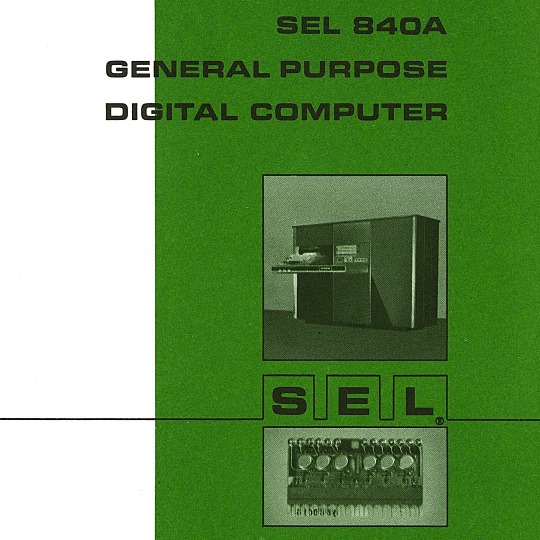


🎄💾🗓️ Day 11: Retrocomputing Advent Calendar - The SEL 840A🎄💾🗓️
Systems Engineering Laboratories (SEL) introduced the SEL 840A in 1965. This is a deep cut folks, buckle in. It was designed as a high-performance, 24-bit general-purpose digital computer, particularly well-suited for scientific and industrial real-time applications.
Notable for using silicon monolithic integrated circuits and a modular architecture. Supported advanced computation with features like concurrent floating-point arithmetic via an optional Extended Arithmetic Unit (EAU), which allowed independent arithmetic processing in single or double precision. With a core memory cycle time of 1.75 microseconds and a capacity of up to 32,768 directly addressable words, the SEL 840A had impressive computational speed and versatility for its time.
Its instruction set covered arithmetic operations, branching, and program control. The computer had fairly robust I/O capabilities, supporting up to 128 input/output units and optional block transfer control for high-speed data movement. SEL 840A had real-time applications, such as data acquisition, industrial automation, and control systems, with features like multi-level priority interrupts and a real-time clock with millisecond resolution.
Software support included a FORTRAN IV compiler, mnemonic assembler, and a library of scientific subroutines, making it accessible for scientific and engineering use. The operator’s console provided immediate access to registers, control functions, and user interaction! Designed to be maintained, its modular design had serviceability you do often not see today, with swing-out circuit pages and accessible test points.
And here's a personal… personal computer history from Adafruit team member, Dan…
== The first computer I used was an SEL-840A, PDF:
I learned Fortran on it in eight grade, in 1970. It was at Oak Ridge National Laboratory, where my parents worked, and was used to take data from cyclotron experiments and perform calculations. I later patched the Fortran compiler on it to take single-quoted strings, like 'HELLO', in Fortran FORMAT statements, instead of having to use Hollerith counts, like 5HHELLO.
In 1971-1972, in high school, I used a PDP-10 (model KA10) timesharing system, run by BOCES LIRICS on Long Island, NY, while we were there for one year on an exchange.
This is the front panel of the actual computer I used. I worked at the computer center in the summer. I know the fellow in the picture: he was an older high school student at the time.
The first "personal" computers I used were Xerox Alto, Xerox Dorado, Xerox Dandelion (Xerox Star 8010), Apple Lisa, and Apple Mac, and an original IBM PC. Later I used DEC VAXstations.
Dan kinda wins the first computer contest if there was one… Have first computer memories? Post’em up in the comments, or post yours on socialz’ and tag them #firstcomputer #retrocomputing – See you back here tomorrow!
#retrocomputing#firstcomputer#electronics#sel840a#1960scomputers#fortran#computinghistory#vintagecomputing#realtimecomputing#industrialautomation#siliconcircuits#modulararchitecture#floatingpointarithmetic#computerscience#fortrancode#corememory#oakridgenationallab#cyclotron#pdp10#xeroxalto#computermuseum#historyofcomputing#classiccomputing#nostalgictech#selcomputers#scientificcomputing#digitalhistory#engineeringmarvel#techthroughdecades#console
28 notes
·
View notes